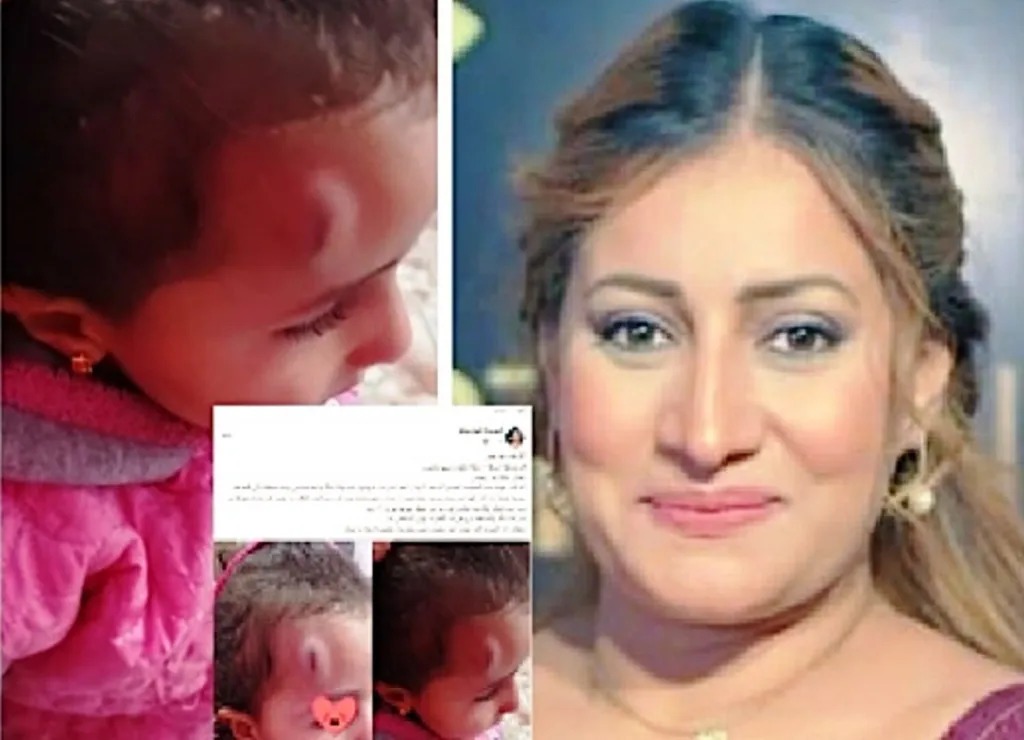طفلة مسيحية تتعرض للرجم بسبب تناول الطعام خلال رمضان في مصر
ريموند إبراهيم/كوبتك سوليدرتي/26 آذار/2025
Little Christian Girl Stoned for Eating During Ramadan in Egypt
Raymond Ibrahim/Coptic Solidarity/March 26/2025
Once again, fanaticized Muslims in Egypt have made clear that, if they have to feel any kind of deprivation for their faith, everyone has to also feel it.
On the morning of March 16, a man hurled rocks at a very small girl, hitting her in and severely wounding her head (leaving very visible bumps and scare). Her crime? She was eating in public, and he, the pious Muslim, was fasting for Ramadan and simply incapable of seeing anyone else eat.
The little girl’s mother, Marcelle Fouad (a Christian name), shared the incident, which occurred in Alexandria, on her Facebook page:
I was on my way to drop my daughter off at daycare around 9:00 in the morning. As we walked, we ate some food we had bought. Suddenly, a man got out of a private car, shouted, “Oh Allah—I am fasting!” and hurled stones at us three times. One of them hit my daughter’s head.
Although the perpetrator was identified by surveillance cameras, according to the report, “Ms. Marcelle wonders what legal action can be taken to obtain her rights—or whether it’s pointless?”
This is hardly the first time a Christian in Egypt gets attacked in the context of Ramadan. As one example, during Ramadan of 2022, a man berated and beat a Coptic Christian woman because she entered his establishment with her head uncovered.
According to the Arabic-language report, Nevin Sobhi, a 30-year-old married mother, went to her local drugstore to pick up some medication for her young son, who accompanied her. On entering, she noticed that the head pharmacist, Dr. Ali Abu Sa‘da, was giving her “the evil eye.” Before long, what was in his eyes reached his tongue: he launched into a loud and “hate-filled tirade” against her for daring to enter his store during Ramadan without any head covering and while wearing a short-sleeved T-shirt.
It should be noted that Ali was aware that Nevin – a regular client – was Christian and, therefore, not obligated to observe Ramadan’s rules. When the Copt told him as much, he responded with a violent slap to her face. When the startled woman responded with shock and anger, he slapped her again—all while her scared, young son cried.
Nevin ran outside, “in a state of collapse, crying and incapable of absorbing the shock.” She contacted her family, and they went to the local police station to report the incident. There, Nevin received what she called her “third slap.” According to the Christian woman:
Inside the police station, I was surprised by attempts and pressure to “conciliate.” The perpetrator’s lawyer steered the writing of the report [in a manner] that contradicted reality, and they forced me to sign the report which contained statements from the pharmacist’s lawyer without taking my statements. […] We were especially shocked to see the report said that “the pharmacist is a friend of the family, who was just bantering and joking around with Mrs. Nevin, because he is close to the family.”
Continued the woman: “I was so shocked; it was as a third slap to me—that such a radical character could emerge victorious, even as I lose my rights as an Egyptian woman!”
In short, violence against those who do not outwardly conform to the strictures of Ramadan—even if they are non-Muslims and therefore exonerated—is common throughout Egypt and the Muslim world at large.
Some days before the pharmacy incident, for example, a video surfaced of a woman in hijab yelling at and hitting Coptic girls in a bus for not being properly veiled. Muslim women have even been known to clandestinely—and sometimes not so clandestinely—cut off the uncovered hair of Christian women. To quote from a report,
Two niqab-wearing women assaulted and forcefully cut the hair of a Christian woman on the metro Sunday, the third such reported incident in two months, raising fears of a growing vigilante movement to punish Egyptian women for not wearing the veil in public…. [T]he assaulters called the Christian woman, who is 28 years old, an “infidel” and pushed her off the train, breaking her arm.
https://www.copticsolidarity.org/2025/03/26/little-christian-girl-stoned-for-eating-during-ramadan/
طفلة مسيحية تتعرض للرجم بسبب تناول الطعام خلال رمضان في مصر
ريموند إبراهيم/كوبتك سوليدرتي/26 آذار/2025
(ترجمة من الإنكليزية بواسطة موقع غوغل)
مرة أخرى، يثبت المسلمون المتطرفون في مصر أنه إذا كان عليهم أن يعانوا أي نوع من الحرمان بسبب إيمانهم، فعلى الجميع أن يعاني أيضًا.
في صباح يوم 16 مارس، قام رجل برشق فتاة صغيرة جدًا بالحجارة، مما أصاب رأسها بجروح خطيرة وترك كدمات واضحة وندوبًا. جريمتها؟ كانت تأكل في العلن، بينما كان هذا المسلم “التقي” صائمًا في رمضان وغير قادر على رؤية أي شخص آخر يأكل.
شاركت والدة الطفلة، مارسيل فؤاد (اسم مسيحي)، تفاصيل الحادث الذي وقع في الإسكندرية على صفحتها في فيسبوك:
“كنت في طريقي إلى دار الحضانة مع ابنتي حوالي الساعة التاسعة صباحًا. وأثناء سيرنا، كنا نأكل بعض الطعام الذي اشتريناه. فجأة، خرج رجل من سيارة خاصة، وصرخ قائلاً: “يا الله، أنا صائم!”، ثم ألقى علينا الحجارة ثلاث مرات. واحدة منها أصابت رأس ابنتي.”
ورغم أن الجاني تم التعرف عليه عبر كاميرات المراقبة، إلا أن التقرير يشير إلى أن “السيدة مارسيل تتساءل عن الإجراءات القانونية التي يمكن اتخاذها للحصول على حقوقها – أم أن الأمر بلا جدوى؟”
هذه ليست المرة الأولى التي يتعرض فيها مسيحي في مصر لهجوم بسبب رمضان. كمثال، خلال رمضان عام 2022، قام رجل بإهانة وضرب امرأة قبطية لأنها دخلت محله دون تغطية رأسها.
وفقًا لتقرير باللغة العربية، فإن نيفين صبحي، وهي أم متزوجة تبلغ من العمر 30 عامًا، دخلت إلى صيدليتها المحلية لشراء دواء لابنها الصغير الذي كان برفقتها. وعند دخولها، لاحظت أن الصيدلي الرئيسي، الدكتور علي أبو سعدة، كان يرمقها بنظرات غاضبة. وبعد لحظات، تحول ما في عينيه إلى كلمات، إذ بدأ في صراخ “مليء بالكراهية” ضدها لأنها تجرأت على دخول متجره خلال رمضان بدون غطاء رأس، وكانت ترتدي قميصًا بأكمام قصيرة.
كان علي يعلم أن نيفين – وهي زبونة دائمة – مسيحية، وبالتالي ليست ملزمة بمراعاة قواعد رمضان. وعندما أخبرته بذلك، رد عليها بصفعة قوية على وجهها. وعندما صدمت المرأة وردت بغضب، صفعها مرة أخرى – بينما كان ابنها الصغير يبكي من الخوف.
خرجت نيفين من الصيدلية وهي منهارة، تبكي وغير قادرة على استيعاب الصدمة. فاتصلت بأسرتها، وذهبوا معًا إلى مركز الشرطة للإبلاغ عن الحادث. لكن هناك، كما قالت نيفين، تعرضت “للصفعة الثالثة”. وفقًا لما قالته:
“داخل قسم الشرطة، فوجئت بمحاولات وضغوط للتصالح. المحامي الخاص بالجاني كان يوجه كتابة التقرير بطريقة تخالف الحقيقة، وأجبروني على التوقيع على التقرير الذي تضمن تصريحات محامي الصيدلي دون أخذ أقوالي. […] لقد صُدمنا عندما رأينا أن التقرير ينص على أن “الصيدلي صديق للعائلة، وكان يمزح مع السيدة نيفين لأنه قريب من العائلة.”
وتابعت المرأة قائلة: “لقد صُدمت جدًا؛ كان الأمر بمثابة الصفعة الثالثة لي – أن يخرج هذا الشخص المتطرف منتصرًا، بينما أفقد حقي كامرأة مصرية!”
باختصار، فإن العنف ضد من لا يلتزم ظاهريًا بقيود رمضان – حتى لو كانوا غير مسلمين، وبالتالي غير ملزمين – هو أمر شائع في جميع أنحاء مصر والعالم الإسلامي بأسره.
قبل أيام قليلة من حادثة الصيدلية، ظهر مقطع فيديو لامرأة محجبة تصرخ في وجه فتيات قبطيات في حافلة وتضربهن لأنهن لم يكن محجبات بشكل “لائق”. حتى أن بعض النساء المسلمات يُعرف عنهن قيامهن بقص شعر النساء المسيحيات غير المحجبات سرًا – وأحيانًا علنًا.
وجاء في تقرير آخر:
“هاجمت امرأتان منتقبتان امرأة مسيحية وقامتا بقص شعرها بالقوة داخل المترو يوم الأحد، وهو الحادث الثالث من نوعه في غضون شهرين، مما أثار مخاوف من تصاعد الحركات المتطرفة لمعاقبة النساء المصريات على عدم ارتداء الحجاب في الأماكن العامة… [وقامتا] بوصف المرأة المسيحية، التي تبلغ من العمر 28 عامًا، بأنها “كافرة”، ثم دفعتاها خارج القطار، مما أدى إلى كسر ذراعها.”






















